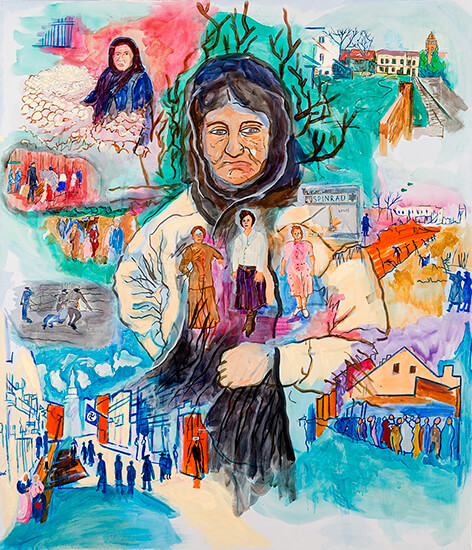
Faces of Dynów
Chaya Spinrad
Every night, after her father’s remarriage, Bella would go to her grandmother’s to sleep. She didn’t want the old woman to be alone, and besides, she hated everyone in her father’s house. Holding a lantern, she’d stumble through the dark streets, muddy in spring, frozen and rutted in winter. At her grandmother’s she stormed and wept, reporting the trespasser’s latest violations, the daily favoritism shown her own children, the father’s betrayal. The old woman, still grieving for her daughter, tried her best to calm Bella. “My daughter died. You lost your mother. It was God’s will.” Finally, realizing that her grandchild was irreconcilable and that bitterness blocked her future, she came up with a solution. “Go away, Bleemele, then you won’t have to see or care what goes on in that house. You’ll have a different life. A life of your own.” “Where shall I go?” the grandchild asked. Going away evoked that nightmare flight from pogrom and war, which had led the family to Hungary and Czechoslovakia, with her mother’s death en route. The old woman pointed to two photographs of her other daughters, which hung on the wall. “Go to them. To America. They’ll treat you like a daughter.”
Permission from her father, letters to America, and arrangements got under way. One morning, in the meantime, Bella came racing to her grandmother’s house. Panting and sobbing. She’d seen that woman wearing the gold chain. The chain the little girl remembered hanging on her own mother’s neck, beneath that sweet face with those rain-colored eyes and ash-blond plaits. Its burnished gold had illumined her way as she went about her everyday chores in their Polish village: sweeping, stoking the wood stove and baking bread, putting on the soup pot and throwing mushrooms inside, shelling peas, shining the copper kettle, nursing the baby, braiding Bella’s hair, playing cat’s cradle with Bella, handing her after school a thick slice of black bread with goose fat and salt. For ten years Bella’s mother had worn that chain. True, her father had bestowed it as a wedding gift to the new wife, but it was one thing to own it, another for that witch to flaunt it on her neck? Until now, it had always been kept in a drawer. Nowadays, the only time she took it off was when she went to the monthly ritual bath—she should only drown. Seeing those gold links around the smooth, plump, hateful neck of the intruder, my mother wished that it were a noose. She wept bitterly to her grandmother. Even the old woman became riled. Better that the chattel be in her grandchild’s possession than with a fremde, an outsider. “Look,” she advised my mother, “if you really want to get the chain, there’s a way. One day when the other one comes from the baths, tell her that you have some papers in the drawer, which I néed in order to send for your passport. And then…” My mother carried out the plot. No sooner than the stepmother unlocked the drawer than Bella grabbed the chain and dashed out of the house.
The stepmother ran and overtook her, whereupon Bella gave the woman a violent push that threw her to the ground, and then escaped to her grandmother. The old woman kissed and hugged her grandchild. Meanwhile, the beleaguered stepmother was furiously recounting the whole story to her husband. My grandfather came at once to his mother-in-law's house. When he entered, Bella burst into tears. “Why are you crying?” he asked. “First, you take my wife’s chain and beat her up, and then you cry?” Bella could not stop. Her body heaved with sobs. Patting her head, her father said softly, “If you had asked me for the chain in a nice way, I would have given it to you…it was your mother’s…Come home.”
“I won’t go home,” Bella told him. “I’ll stay here.” Her grandmother was crying too. “Give me the chain,” said the father. “Before you leave for America, I’ll return it to you.” But the grandmother spoke up. “She took it. She has it. So let it be.
”And it was.
My mother never returned to her father’s house.
When her boat arrived at Ellis Island, the chain was on her neck. For fifteen years after her arrival, it lay in a drawer. When I was thirteen and my sister ten, my mother took it to a jeweler, who made of it two bracelets, a double row of gold links interspersed with flat golden bars and joined at the center with an inscribed gold heart. I never wear the bracelet. It lies in my drawer. I’m afraid of losing it.
From A Book About My Mother, by Toby Talbot, regarding Chaya Spinrad